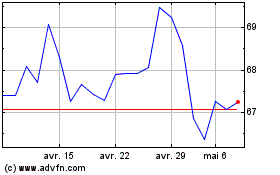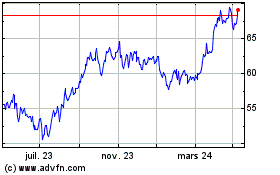Oil Gains as Market Braces for Iran Sanctions
18 Mai 2018 - 12:44PM
Dow Jones News
By Christopher Alessi
LONDON -- Oil prices rose Friday, with Brent crude trading close
to the $80-a-barrel threshold, in anticipation of renewed U.S.
economic sanctions on Iran.
Brent crude, the global oil benchmark, was up 0.5% to $79.69 a
barrel on London's Intercontinental Exchange, having on Thursday
briefly breached $80 a barrel for the first time in 3 1/2 years. On
the New York Mercantile Exchange, West Texas Intermediate futures
traded up 0.2% at $71.62 a barrel.
President Donald Trump last week pulled the U.S. out of a 2015
international agreement to curb Iran's nuclear program, setting the
stage to reinstate sanctions on the Islamic Republic, a member of
the Organization of the Petroleum Exporting Countries.
Even though the European Union has decided to stick to the
accord, energy companies in the region have already started to pull
back from Iran. On Wednesday, French oil giant Total SA said it
would withdraw from an agreement to help develop a gas field off
Iran if it wasn't granted a waiver by the U.S. Total had signed a
$1 billion deal to develop Iran's South Pars field.
The decision was a concrete sign that U.S. sanctions could
hinder Iran's oil industry and further reduce global supply. Iran
currently exports around 2.4 million barrels a day of crude.
Analysts estimated that anywhere between 400,000 to a 1 million
barrels could be at risk once sanctions are fully reinstated in six
months.
The move by Total "confirmed that European companies with
business and banking activities in the U.S. cannot afford to go up
against the U.S. Iran sanctions unless they get assurances against
possible secondary sanctions for their U.S. activities," said
Bjarne Schieldrop, chief commodities analyst at SEB Markets.
Concerns over Iranian supply come amid an increasingly tight oil
market. The International Energy Agency on Wednesday said
commercial petroleum stocks in Organization for Economic
Cooperation and Development countries fell to the lowest level in
three years, and below a closely watched five-year average metric
for the first time since 2014.
In its monthly oil-market report, the IEA suggested the drawdown
in stocks was evidence that OPEC's coordinated efforts to cut
output have succeeded in clearing up a global supply glut that had
weighed on the market since late 2014.
OPEC and 10 producers outside the cartel, including Russia, have
been holding back crude production by around 1.8 million barrels a
day since the start of last year. The agreement, which was extended
in November, is set to expire at the end of 2018.
On Thursday, Saudi Arabia -- the de facto head of OPEC and the
world's largest crude exporter -- said it was in talks with other
OPEC members and Russia over "recent market volatility," amid
concerns prices are rising too high.
Oil market observers will also be looking ahead to elections
this weekend in Venezuela, where ongoing supply outages have
already helped to bolster prices in recent months. "Incumbent
President Nicolás Maduro is a shoo-in to win and this might provoke
the wrath of Washington which is actively mulling over broad oil
sanctions on Venezuela," said Stephen Brennock, analyst at
brokerage PVM Oil Associates Ltd.
"Against this backdrop," he added, "the odds are on further
price upside with calls for $100 oil growing by the day."
Among refined products, Nymex reformulated gasoline blendstock
-- the benchmark gasoline contract -- was down 0.30% at $2.24 a
gallon. ICE gas oil, a benchmark for diesel fuel, changed hands at
$699.50 a metric ton, down 0.67% from the previous settlement.
Write to Christopher Alessi at christopher.alessi@wsj.com
(END) Dow Jones Newswires
May 18, 2018 06:29 ET (10:29 GMT)
Copyright (c) 2018 Dow Jones & Company, Inc.
TotalEnergies (EU:TTE)
Graphique Historique de l'Action
De Mar 2024 à Avr 2024

TotalEnergies (EU:TTE)
Graphique Historique de l'Action
De Avr 2023 à Avr 2024
